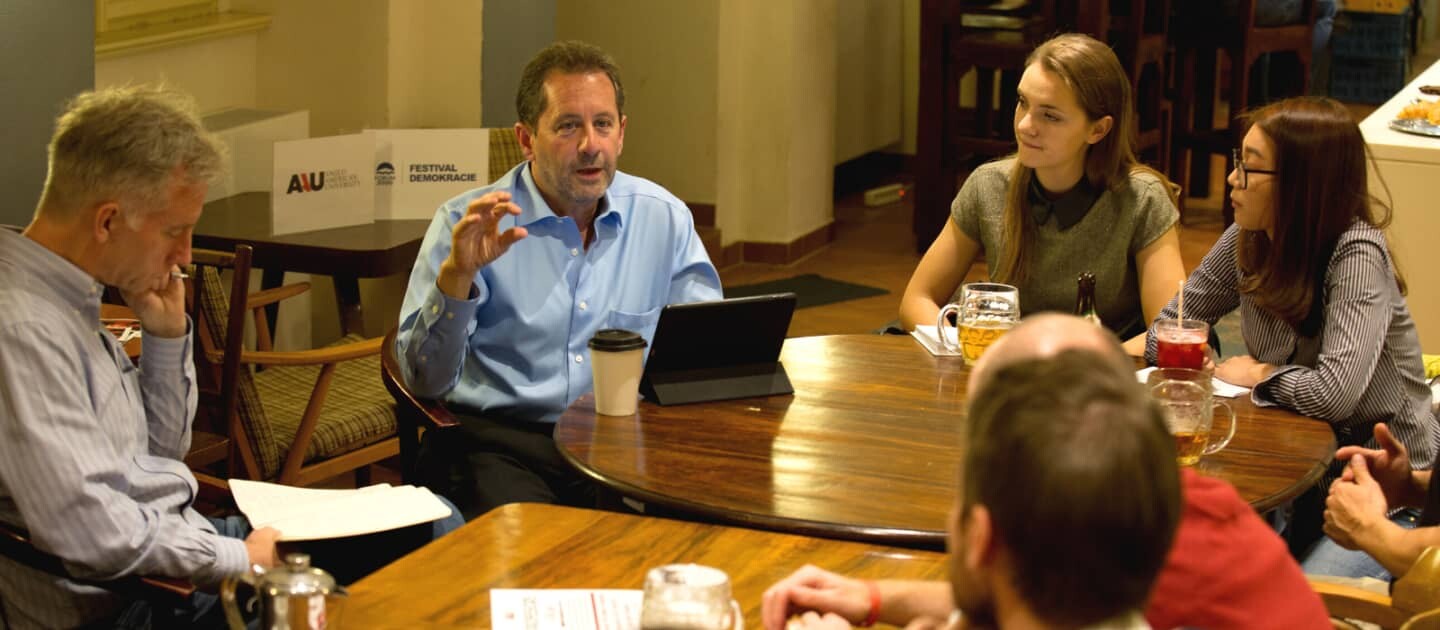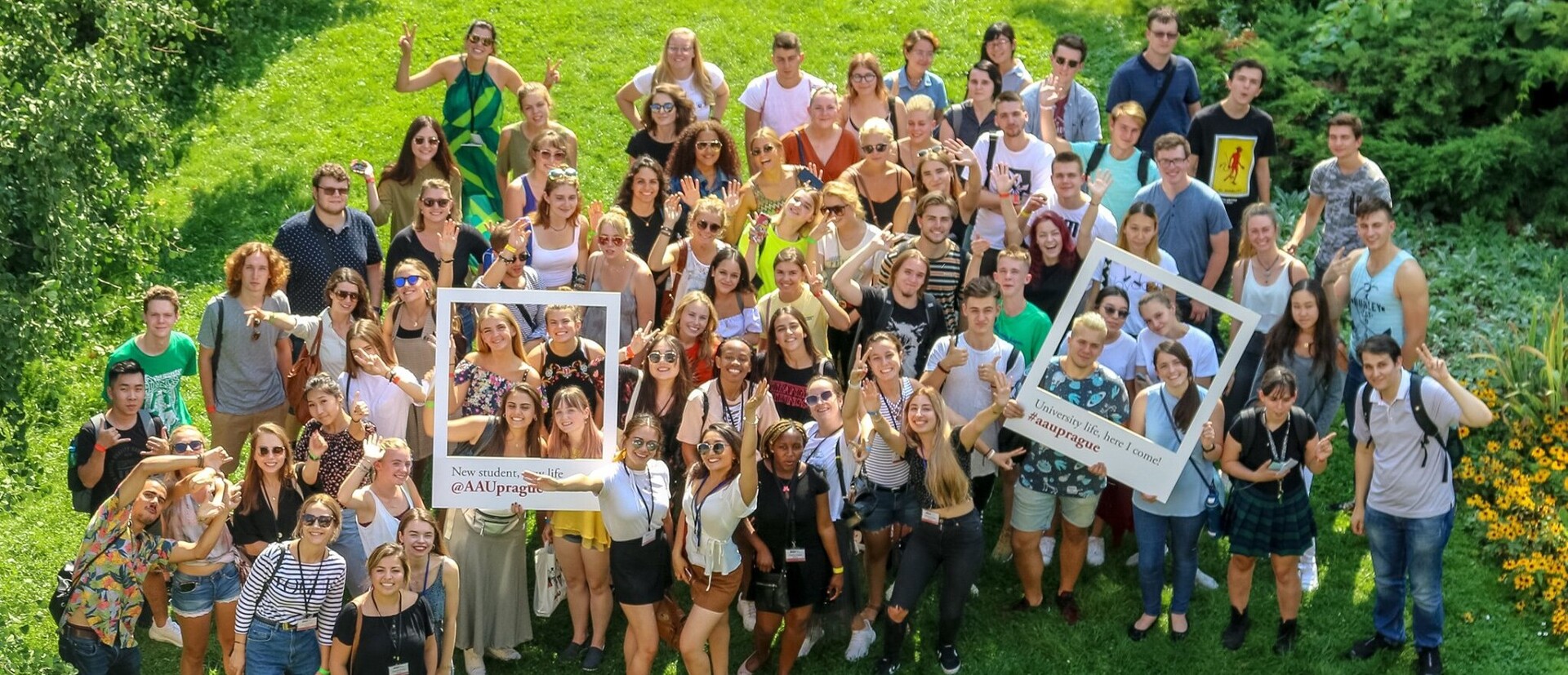B.A. in Political Science: Conflict and Democracy Studies
Anglo-americká vysoká škola, o.p.s. (AAUNI)
-
Lokalizacja Praga, Czechy
-
Degree Type BA
-
Start Date Request info
-
Zajęcie 3 years
-
Application Deadline Request info
-
Języki Angielski
-
Uwaga! On Campus
-
mijesca Imię
-
Pace Instructor-paced
-
Tuition fees 538800 Kč
Opis pokoju
Undergraduate Program
Political Science: Conflict and Democracy Studies
The B. A. in Political Science: Conflict and Democracy Studies program at Anglo-American University is taught by faculty that received training from European, British, and American institutions – bringing many years of dynamic professional experience to the classroom.
About the program
This program instructs students through a range of comparative approaches to the study of conflict outcomes and democratic systems of governance. It specifically instructs students on the nature of different forms of conflict including conflict between states, within states, and sub-national conflict.
Students will learn about the determinants of conflict onset, duration, and resolution. Likewise, they will study the different strategies of collective action that can be observed in contexts featuring both nonviolent dissent and political violence (including civil war and stages of radicalization), along with how these strategic processes influence empirical trends of democratization.
The Conflict and Democracy Studies concentration draws from scientific literature found in top political science and international relations journals to teach students about the most recent theoretical and empirical trends on democratic backsliding, individual and group based forms of radicalization, and humanitarian intervention, including conflict resolution. Together, these topics will provide students with a thorough overview of the interplay between democratic institutions and conflict.
Upon completion, our students will acquire an ability to develop logically coherent arguments on conflict and democracy; synthesize different literatures pertaining to specific research questions and outcomes; draw on popularly used data sets to inform their qualitative assessment of single or multi-country cases; understand the trends inherent to the outbreak and duration of different forms of conflict.

Beyond the classroom you can join student clubs like Diplomacy or Model UN, practice your debate skills at a faculty-student debate or discuss current political issues with professors and local experts at an event like ‘Professors in the Pub’.
AAU’s Career Center also connects students with numerous professional internships in the Czech Republic and abroad every year.
“AAU makes networking incredibly easy to do. I was able to participate in various events that don’t necessarily connect to my coursework—conferences, literature festivals, debates, lectures, etc. AAU has helped me and my club get in touch with event-organisers, which, for example, allowed us to host an event during the Festival of Democracy organised by the famous Forum 2000 conference. ”
Veronika Bartáková, IR student, President of Diplomatic Club
As of January 2021 AAU is a Member of the European Consortium for Political Research. ECPR is the leading scholarly society for political scientists in Europe with over 300 institutional members in nearly 50 countries. This will allow AAU students and faculty to participate in ECPR events and become members of some of its standing groups.
Program Structure
Political Science: Conflict and Democracy Studies is a 3-year study program. To graduate, students must accumulate 90 US credits (180 ECTS credits) by completing 30 courses.
General Education Courses
- Composition I
- Composition II
- Computer Information Systems
- Intro to Economic Thought
One of the two:
- World History II
- European History II
Major Courses
- Introduction to Politics (Politics I)
- Political Philosophy I
- Politics II
- Political Philosophy II
- Political Economy
- Nations and Nationalism
One of the two:
- Intro to Sociology
- Intro to Law
One of the two:
- US Politics / West Europe Politics
- On top of that students are also required to complete the Thesis Seminar, Internship, and Thesis module.
Concentration Courses
- Non-Violent Conflict: Theory and Application
- Democratization and Survival of Autocrats
- Radicalization Trends in Party Politics
- Politics of Religion and Ethnicity / Islam and the West
- Emergence of the Modern Middle East / Middle Eastern Society and State
- Political Violence
- Human Rights / Intervention, Statebuilding and Sovereignty
- Political and International Conflicts in Asia
Open Electives Module
Students can choose 5 elective courses offered by the School of International Relations & Diplomacy as listed below or electives offered by any other school at AAU.
School of International Relations & Diplomacy Electives
- French I / German I / Spanish I or Russian I
- French II / German II / Spanish II or Russian II
- American Foreign Policy in Film
- British Foreign Policy
- Central European History
- Culture Wars in the West: Politics of the Digital Era
- Democracy in the USA
- Democratization and Survival of Autocrats
- Editorial Cartoons in Political and Social Science
- (The) Emergence of the Modern Middle East
- Germany in the 20th Century
- Global Governance
- Human Rights
- Islam and the West
- (The) Legacies of Totalitarianism: Post-Totalitarian Europe
- Non-Violent Conflict: Theory and Application
- Political Parties and Party Systems
- Russian Foreign Policy
- Sustainable Development: From Global Vision to Meaningful Practice
- Terrorism in Global Politics
- US – UK Special Relationship
- US in Global Politics (in the Age of Trump)
- US National Security Policy
Learning Outcomes
Graduates of the B. A. in Political Science: Conflict and Democracy Studies can expect to:
- Successfully differentiate between different conflict processes.
- Understand the trends and correlations associated with democracy and conflict.
- Explain why some types of countries are likelier than others to experience civil war.
- Explain the evolution of United Nations peace keeping operations (PKOs).
- Differentiate between varying cleavages of ethnic and religious motivations in conflict.
- Understand the types of political, judicial, and economic constraints that democratic institutions present political actors in conflict settings.
Career Prospects
AAU graduates thrive in multinational environments and are able to communicate professionally in English to international audiences. As a graduate of this degree program, you will be well equipped to continue your studies or pursue a global career in areas such as:
- Governmental, Foreign Affairs Institutions
- International Organizations
- Think Tanks
- Humanitarian Government or NGO’s
- Pursuing of Advanced/Postgraduate Degree
See what our students have to say
I enjoy classes at AAU, especially political philosophy because it is teaching me how to communicate in social communities and this skill could be used both in daily life and in business. Plus, our professor is amazing. I’ve never seen such a charismatic and interesting person who dives fully into the subject of every lesson.
Danil Gulko- International Relations, Kazakhstan



